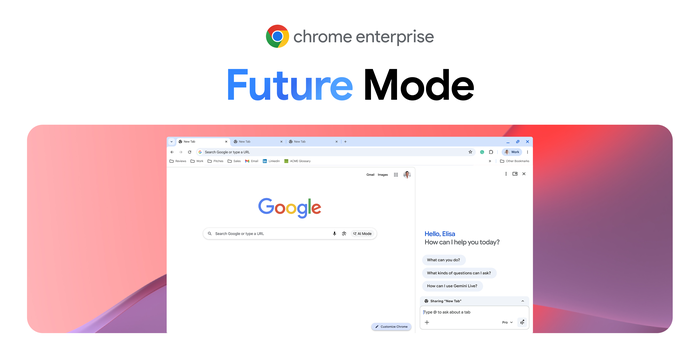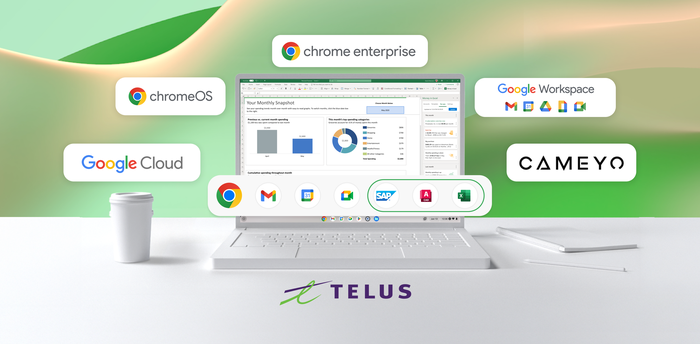Leading with digital sustainability

John Maletis
VP, ChromeOS - PM, Engineering, UX
Leading with digital sustainability
As a business leader today, you’re juggling a lot of priorities. You’re focused on improving productivity, protecting your company against risk, and reducing operational costs, just as you’ve always done. But you also have new, big challenges to address, from climate change to employee burnout and ongoing inflation.
Balancing environmental stewardship, employee well-being, and financial security while running a business is demanding — in part because these priorities seem to exist in tension with each other. Complex challenges often reveal new opportunities, and business leaders can drive sustainable value by embracing the tension and developing a multi-front strategy.
When I think about the way forward, the word “sustainable” comes to mind — as in making decisions that will create value today and tomorrow. Yes, the term typically relates to positive environmental impact, but it’s time to expand the definition.


Digital sustainability maximizes sustainable value across environmental, social, and financial outcomes to give you a competitive edge — now and into the future
At Chrome Enterprise, we believe digital sustainability is a framework for addressing the triple bottom line: the planet, your people, and your profitability. We use it as a lens for building cloud-first solutions that reduce organizations’ environmental footprint, support employee well-being, and optimize technology budgets.
I’m eager to share steps you can take today to bring digital sustainability into your organization.
Environmental sustainability: Acting to reduce or eliminate the negative impact your company and products have on the planet
Moving to the cloud is a great first step toward enabling environmental sustainability. On average, cloud migration can reduce a company’s carbon emissions by 84%.1 In 2021, the world was projected to generate 57.4 million tons of e-waste, which is like throwing away 1,148 laptops every second.2
You can reduce your company’s e-waste with technology that lasts longer and extends the lifespan of existing devices.
To support this effort, ChromeOS Flex, enables you to download and install a modern OS on aging PCs and Macs at no cost.
And when it’s time for new devices, Google can help you take another step in the right direction with Chromebooks that consume 46% less energy than competitive devices.3
Social sustainability: Identifying and managing the impact your business has on your people
Promoting employee productivity and well-being is critical for business success today. You can work toward both outcomes by creating modern, flexible work environments.
Equipping teams with cloud-based tools that power asynchronous collaboration is one way to do this. Chrome browser and ChromeOS offer a secure environment for collaboration, promoting an inclusive workplace that allows everyone to contribute at any time.
Google is helping support employee engagement and well-being with solutions like work profiles that encourage people to set healthy boundaries. The cloud-based management capabilities of ChromeOS and Chrome browser also reduce administrative burdens on IT teams, so they can focus on the work that matters most.
Google Workspace helps build collaboration equity, or the ability for all workers to to contribute and communicate equally, regardless of location, role, experience level, language, and device preference. Tools like Companion mode, for Google Meet, gives both in-person and off-site attendees the same meeting experience. While Google Meet’s auto-generated captions help global teams connect in their language of choice. Google Meet also provides features like portrait light and de-reverberation to help everyone be seen, heard, and understood, even in locations with poor connectivity or dim lighting.
Giving all people the ability to work is a core principle for us when developing solutions. One billion people experience some form of disability.4 In Chrome browser, we’ve made it possible to enlarge text and images as well as apply real-time captions to online media. ChromeOS has a built-in screen reader, which enables diction, select-to-speak, and spoken feedback, to help users with visual impairments — and with voice switching functionality, the screen reader’s voice automatically changes based on the language of the text being read.
Financial sustainability: Managing your business’s financial health to ensure short-term success and minimize threats to future profitability
You can create sustainable value with solutions that lower operational costs, reduce risk, and help you effectively allocate IT resources.
You can reduce the cost of ownership of devices and hardware. A company that switches to ChromeOS devices may save $3,901 per device over the first three years of ownership, resulting in hundreds of thousands of dollars in savings across your fleet.5
With the average cost of a data breach now topping $4.35 million,6 security must be a financial priority. Chrome browser and ChromeOS are secure by design, with built-in protections and automatic updates. In fact, there have been zero reported ransomware attacks on ChromeOS devices.
To learn more, we invite you to attend our Resilience starts with IT webinar, where we will discuss how to keep your business strong in any economic climate.
This is just the beginning
The technology you introduce today could be the solution that helps your company lower its annual emissions, keeps a valuable employee from burning out, and redirects enough resources to support a new innovation.
1 Accenture, The Green behind the Cloud, 2020
3 Sutton-Parker, J. (2020), Determining end user computing device Scope 2 GHG emissions with accurate use phase energy consumption management, 1877-0509, Amsterdam, the Netherlands: Science Direct Elsevier B.V.



